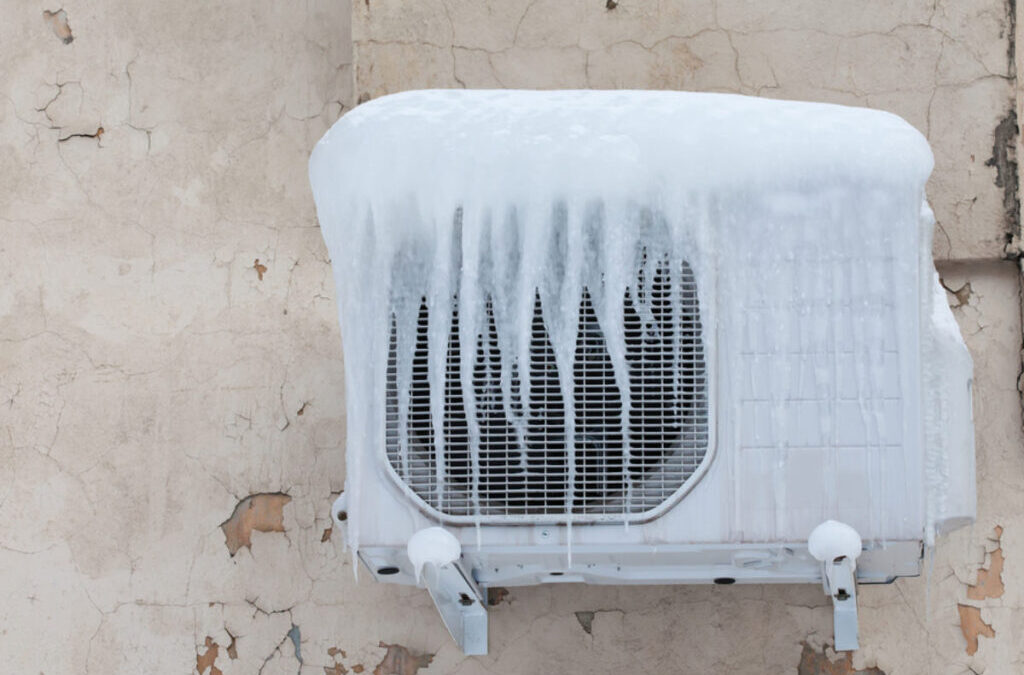Despite the hot and humid weather that sweeps through the summer months, an AC freezing up is one of the most common reasons the unit stops working properly. Ironically, dealing with ac unit frozen coils likely means there’s no cool air pumping into your home.
To remedy your HVAC issue, we’ll walk through what causes AC frozen conditions, symptoms to look for, and what you can do to break the ice (literally). Some solutions are simple and safe enough for you to attempt, but if the AC keeps freezing after your best efforts, it’s time to call in an HVAC specialist.
Why is my air conditioner frozen?
The main reason an air conditioner freezes is because of poor air flow. AC units operate based on the Joule-Thomson Effect. Hot airflow is drawn to warm refrigerant gas, which expands and cools.
If your AC unit’s warm air flow is interrupted and doesn’t blow through the evaporator coil where heat transfers, the system can be thrown off balance. It results in a frozen evaporator coil or the AC line frozen.
Causes of frozen evaporator coil in AC:
- Dirty coils: AC units typically draw in household dust. Air filters are the first line of defense, but not all the dust is captured. Dirty coils can cause airflow restrictions, leading to an AC freezing.
- Clogged air filters: Failing to clean or replace your air filters will end up blocking the flow of warm air from your house into the AC unit. Regularly inspecting your air filters and keeping them clean is one of the easiest ways to reduce the risk of an AC frozen over.
- Damaged blower fan: If the fan that keeps air moving from the house to the coils malfunctions or stops working altogether, your system’s temperature will drop, allowing the coil to freeze up.
- Collapsed air ducts: If an air duct is collapsed or blocked, the airflow will be interrupted.
- Clogged condensation lines: AC coils frozen can be caused by a blocked condensation/drain line. If the water collected from condensation cannot escape due to a clog, the moisture could become trapped near the evaporator coil and freeze over.
- Low refrigerant: If refrigerant, or coolant, is leaking and the level becomes low, the refrigerant is less pressurized, often contributing to a frozen AC.
Refrigerant leaks vs mechanical issues
Understanding if your air conditioner freezing up is caused by a refrigerant leak or mechanical issue may be most obvious based on noises made by the outdoor unit.
AC hissing noise
If your outdoor unit is making a constant hissing or whistling noise, a refrigerant leak is likely your cause for an AC unit frozen coil. If you hear this sound coming from your HVAC, turn it off and call a local technician.
The repair for an HVAC leaking refrigerant may call for changing the refrigerant lines, adding more refrigerant, or recharging (pressurizing the refrigerant) the system.
AC grinding or clanging noise
A mechanical issue has likely occurred if you can hear a loud clanging or grinding sound coming from your outdoor HVAC unit. It’s possible that a fan or belt has come loose and is rubbing against another part inside the unit.
The repair for an HVAC fan or belt that has come loose may be replacement of the part or a retightening or replacement of the components that hold the fan and belt in place.
What to do when your AC freezes up?
To avoid further damage, the first thing to do when your AC freezes up is to turn the air conditioner off. From the thermostat panel, switch the AC from “cooling” or “auto” to fan mode. Setting your AC in fan mode will help the system receive warm air to help the frozen AC line or coil defrost.
While the system thaws, which can take up to 24 hours depending on the severity of your AC coils freezing, you can work on finding the cause. Walk around the house to perform an inspection.
Ensure that air vents aren’t blocked by furniture, drapes, or toys. Then, take a look at the air filters. It’s possible they may need to be cleaned or replaced to allow proper air flow through to the frozen unit.
Check for piled up foliage near the outdoor unit. Remove any leaves, brush, or litter that may be blocking air flow into the unit.
Once you’ve run the fan long enough for the system to defrost and you’ve inspected for any issues, try running the AC again and watch for signs of the AC freezing up.
Air conditioner frozen: Can I fix it myself?
If the AC frozen cause is a dirty air filter, the issue is something you can fix yourself. If you suspect something more severe, like an HVAC refrigerant leak, it’s time to call an HVAC technician.
You won’t know until you follow the steps above. Once the pipe or coil has thawed and you’ve completed your indoor and outdoor inspections, try running your system again. If the AC keeps freezing, it’s time to call in a professional.
How to prevent a frozen AC unit
An AC unit frozen can be prevented quite easily with regular maintenance. Consider these tips on how to prevent a frozen AC unit:
1. Install a humidistat
If you live in a high-humidity area, like along the southeastern coast, the amount of condensation may be too much for your system to handle. A humidistat can keep your indoor moisture levels under control, which could be beneficial to keep mold and mildew problems from rearing up, as well as reducing the chances of your AC freezing.
2. Inspect/replace the air filters
Make it a habit to regularly inspect your AC filters. Clean or replace them as suggested by the manufacturer, which is usually every 60 to 90 days. However, if you’re in a high-pollen area, check the filters more often. Clogged filters impede airflow which could cause AC freezing issues.
3. Schedule an annual maintenance visit
There are parts of your HVAC system you may not be able to see or access. An HVAC professional can inspect specific components, like refrigerant levels and the condition of your blower fan, to catch any issues before they arise. Part of a preventative visit may also include cleaning of the evaporator coils, which can become dirty or clogged. The best time to schedule an HVAC maintenance visit is before the hot season begins.
4. Add (and set) a thermostat
If you live in an area where the days are hot and the nights cool down considerably, a programmable thermostat may keep the system running optimally by shutting off when it’s cooler outside. Smart thermostats can save you money on your electric bill by regulating your indoor temperature.
AC freezing up in hot weather
Discovering a frozen air conditioner in the middle of summer is likely not a task to tackle as a weekend project. Unless the cause is a minor issue, like a dirty filter or blocked air vents, you’ll need to call in the pros.
Schedule seasonal maintenance ahead of summer and winter months to ensure your unit doesn’t fail when you need it most. Routine maintenance can help extend the lifespan of your HVAC system.


